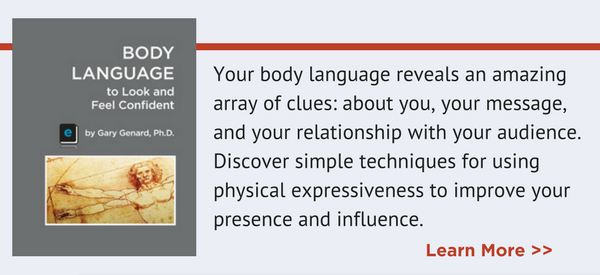 Photo credit: reshot.com/danjazzia
Photo credit: reshot.com/danjazzia
Are you using effective body language when you speak? What about your face? Here's why facial expressions matter greatly in public speaking!
Face it: your facial expressions matter in public speaking. They are a vital part of body language—the tool that determines, in part, how dynamic a presenter you are.
Even so, as a speech coach I'm constantly aware of how many people don't consider the face in physical expressiveness. What's on most people's minds are those appendages you were issued just before you went out to speak. As in:
"What should I do with my hands?"
Do you use body language to be more effective and convincing? Learn how in my Free White Paper, The Body Language Rules: 12 Ways to Be a More Powerful Speaker.
Look At It This Way: You're a Visual Animal!
Did you ever wonder why you don't have to sniff a person to recognize them? No, of course you didn't. You're not a dog! But think about it: we recognize people through sight—though of course for other animals it's different.
What this tells us, is that human beings know others through their face. Your brain is a natural facial recognition system! The next step in this chain of logic is easy, then: we glean essential information from a person's face. Far beyond mere recognition, we're scoping out intentions, trustworthiness, motives, friendliness or disdain, safety vs. danger, and many other indicators of what other people want or intend where we are concerned.
Do you connect with audiences so they like and trust you? Learn how to engage and motivate! Download my Free cheat sheet, "5 Ways to Captivate an Audience."
Audiences Need You to Help Them Understand
If you're a really good speaker, you're concerned with helping people understand what you're saying, not just conveying information. Data does its job quite well . . . but it can't do more. When it comes to interpreting information, putting it into context, explaining why it matters to listeners, letting them know that you share their values, well, then it's necessary for you to weave your magic as a speaker. If you're bored with a presenter, the chances are excellent that he or she hasn't given any thought to giving an effective performance.
This is where physical expression comes in. To help yourself become good (or be better) at this, remind yourself that your speech or presentation needs physical expression. Your body is an excellent and essential speaking tool.
Want more specifics? Here's a great resource: my Free cheat sheet, "Body Language for Public Speaking - 6 Skills Building Exercises."
Far beyond "talking hands," it's your face that physically conveys the subtlest and most direct link to listeners' emotional connection with you. And that's crucial. People whose limbic system or emotional center of the brain is damaged have difficulty making any decisions. That means that as speakers, we always need to be reaching people on an emotional plane so they get on board with what we're saying. Along with your voice—another fine-tuned tool of emotional expression—it's your face that allows this to happen.
As a scientific paper explained it:
The expressions we see in the faces of others engage a number of different cognitive processes. Emotional expressions elicit rapid responses, which often imitate the emotion in the observed face. . . . These gestures indicate, first, that the sender is to be trusted and, second, that any following signals are of importance to the receiver.1
What about ineffective body language? Don't weaken your presentation! Get my Free eGuide, "Negative Body Language: The 7 Deadly Sins of Nonverbal Communication."
Get Those Mirror Neurons Working!
We humans—apart from our delightful ability to know who we're looking at without smelling them—also have another lovely skill that presenters and audiences both benefit from: mirror neurons. These brain cells allow us to observe an action (or facial expression) and identify with it. It's as though the observer were performing the movement or making that expression themself.
In other words, audiences will feel what you want them to feel partly through your facial expressions! Your face is clueing listeners in at all times on how to respond to what you're saying. Would you want to leave this powerful tool out of your attempts to persuade, inform, advocate, or inspire?
And incidentally, the same equation is operating in your favor when you speak in public, and you should be aware of it. Notice your audience's facial expressions as you speak. They are open invitations to fine-tune your content to maximize listeners' attentiveness, comprehension, and retention.
1 Chris Frith, “Role of facial expressions in social interactions,” abstract in Philosophical Transactions B, December 12, 2009, Royal Society Publishing. Accessed at https://www.ncbi.nlm.nih.gov/pmc/articles/PMC2781887/.
You should follow me on Twitter here.
Gary Genard is an actor, author, and expert in public speaking training and overcoming speaking fear. His company, Boston-based The Genard Method offers live 1:1 Zoom executive coaching and corporate group training worldwide. In 2022 for the ninth consecutive year, Gary has been ranked by Global Gurus as One of the World’s Top 30 Communication Professionals. He is the author of the Amazon Best-Seller How to Give a Speech. His second book, Fearless Speaking, was named in 2019 as "One of the 100 Best Confidence Books of All Time." His handbook for presenting in videoconferences, Speaking Virtually offers strategies and tools for developing virtual presence in online meetings. Contact Gary here.



